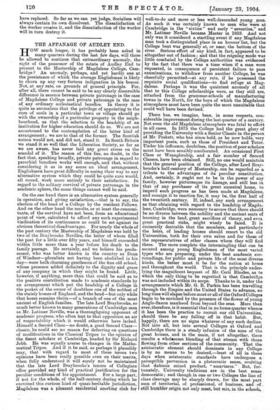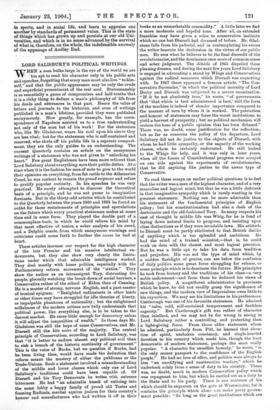N OW much longer, it has probably been asked in many
quarters during the last few days, will there be allowed to continue that extraordinary anomaly, the right of the possessor of the estate of Audley End to present to the Mastership of Magdalene College, Cam- bridge? An anomaly, perhaps, and yet hardly one at the persistence of which the average Englishman is likely to churn up any very furious indignation in his bosom. Not, at any rate, on grounds of general principle. For, after all, there cannot be said to be any clearly discernible difference in essence between private patronage in the ease of Magdalene College and private patronage in the case of any ordinary ecclesiastical benefice. In theory it is quite as anomalous that the privilege of appointing to the cure of souls in a particular town or village should go with the ownership of a particular property in the neigh- bourhood, as that the selection to the headship of an institution for higher education should do so. We are not accustomed to the contemplation of the latter kind of arrangement ; we are to that of the former. The Scottish nation would not, and did not, stand it. In South Britain we stand it so well that the Liberation Society, so far as we are aware, has never laid any great stress on the scandal of it. The reason of this lies, no doubt, in the fact that, speaking broadly, private patronage in regard to parochial benefices works well enough, and that, without considering it as in any sense an ideal arrangement, Englishmen have great difficulty in seeing their way to any alternative system which they could be quite sure would', all round, work more entirely to their satisfaction. In regard to the solitary survival of private patronage in the academic sphere, the same things cannot well be said.
On the one hand there is an alternative system generally in operation, and giving satisfaction,—that is to say, the election of the head of a College by the resident Fellows. And on the other hand the results, or at least the concomi- tants, of the survival have not been, from an educational point of view, calculated to afford any such experimental vindication of its continuance as could be set against its obvious theoretical disadvantages. For nearly the whole of the past century the Mastership of Magdalene was held by two of the Braybrooke Nevilles, the latter of whom filled the post for a little over fifty years, and himself succeeded within little more than a year before his death to the family peerage. He certainly, and we believe his prede- cessor, who was better known in the country as Dean of Windsor—pluralists not having been abolished in his day—were both charming gentlemen of the fine old school, whose presence added definitely to the dignity. and grace of any company in which they might be found. Little, however, if anything, more than that could be said as to the positive contribution made to academic standards by an arrangement which put the headship of a College in the pocket of the owner of doubtless one of the noblest of the stately homes of England, and the head—but only while that home remains theirs—of a branch of one of the most ancient of English families. The late Lord Braybrooke, so much better known to many generations of Cambridge men as Mr. Latimer Neville, was a thoroughgoing opponent of academic progress, who often lent to that opposition an air of respectability which it would otherwise have lacked. Himself a Second Class—no doubt, a good Second Class— classic, he could see no reason for deferring on questions of modifications in the Classical Tripos to the opinion of the finest scholars at Cambridge, headed by Sir Richard Jebb. He was equally averse to changes in the Mathe- matical Tripos. And if it be said, as perhaps it plausibly may, that with regard to most of these issues two opinions have been really possible even on their merits, when fully understood it will surely not be maintained that the late Lord Braybrooke's tenure of Collegiate office provided any land of practical justification for the peculiar conditions of his appointment. _For a large part, if not for ,the whole, of the half-century during which he exercised_ this curious kind of quasi-heritable jurisdiction, Magdalene was a pleasant residential sporting club for Cambridge in the " sixties " and early "seventies," and Mr. Latimer Neville became Master in 1853. And not only was it considered a startling event if any Magdalene man took a distinguished place in an honour list, but the College boat was generally at, or near, the bottom of the river. Serious effort of any kind, in fact, appeared to be altogether out of fashion • and that the reigning mode was little combated by the fashion; authorities was evidenoed by the fact that there was a time when if a man were requested, in consequence of persistent failure to pass examinations, to withdraw from another College, he was cheerfully permitted—at any rate, if he possessed the requisite social qualifications—to find refuge at Mag- dalene. Perhaps it was the quaintest anomaly of all that to this College scholarships were, as they still are, attached from the grammar-schools of manufacturing towns in the North, for the boys of which the Magdalene atmosphere must have been quite the most unsuitable that could well have been devised.
There has, we imagine, been, in some respects, con- siderable improvement during the last quarter of a century. Not even the old Magdalene atmosphere was fatal to effort in all cases. In 1875 the College had the great glory of providing the University with a Senior Classic in the person of Mr. Peskett, who has since held, as he now holds, very important posts, such as those of President and Tutor. Under his influence, doubtless, the position of poor scholars must have been sensibly ameliorated. An occasional First Class or Wranglership, and a fair number of Second Classes, have been obtained. Still, no one would maintain that the general position of the College, after Lord Bray- brooke's half-century of Mastership, can be regarded as a tribute to the advantages of its peculiar constitution. And, certainly, it ought not to be in the power of any family, however picturesque its lineage, and still less in that of any purchaser of -its great ancestral home, to imperil such progress as has been made at Magdalene, and consign it to reaction for, it may be, the first half of the twentieth century. If, indeed, any such arrangement as that obtaining with regard to the headship of Magda- lene, Cambridge, were necessary to secure that there should be no divorce between the nobility and the ancient seats of learning in the land, great sacrifices of theory, and even great practical risks, might wisely be faced. It is eminently desirable that the members, and particularly the heirs, of leading houses should resort to the old Universities, both for their own sakes and for those of the representatives of other classes whom they will fifid there. The more complete the intermingling that can be secured among young Englishmen of the most varied types who are preparing, under the best academic sur- roundings, for public and private life of the most diverse kinds, the better must it be for the nation at home and throughout the world. That is the principle under- lying the magnificent bequest of Mr. Cecil Rhodes, as to which the only thing to be regretted is that Cambridge was not included within its scope. Thanks to it, under the arrangements which Mr. G. R. Parkin has been travelling through the Empire and the United States to advance, no long time will elapse before most or all of the Oxford Colleges begin to be enriched by the presence of the flower of young Anglo-Saxon manhood from beyond the seas. More than ever, therefore, is it essential that in no home quarter whence it has been the practice to recruit our old Universities, should there be any falling off in that habit. But, happily, there are no signs whatever of any such decline. Not into all, but into several Colleges at Oxford and Cambridge there is a steady infusion of the Bens of the great houses, and in the main, if not altogether, there results a wholesome blending of that stream with those flowing from other sections of the community. That the aristocratic element should dominate in any College. is by no means to be desired,—least of all in these days when aristocratic standards have undergone a: perceptible perversion in a plutocratic sense, evolving that dubious mixed product, "smartness." But, for- tunately, University traditions are in.. the best sense democratic ; and though in one or two Colleges the line of class cleavage may be sharply drawn, for . the most part men of :territorial, of professional, of business, and of still humbler origin not only meet, but mix, in the schools,
in sports, and in social life, and learn to appraise one another by standards of permanent value. This is the state of things which has grown up and persists at our old Uni- versities, and which is in no sense advanced by the survival of what is, therefore, on the whole, the indefensible anomaly of the appanage of Audley End.











































 Previous page
Previous page